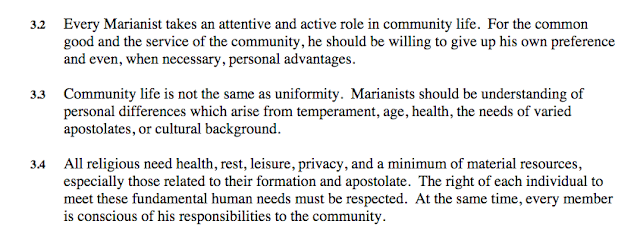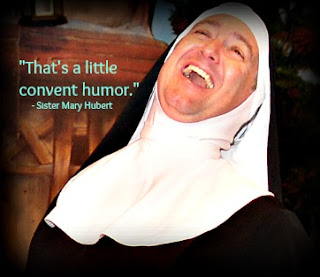18: It's Like He's Dead
I wasn't supposed to be there when it happened. My Assistant Novice Master probably scheduled me to be somewhere in the high school nowhere near the brothers' house that day at that exact time. As things happen though, there I was. I ran up the main stairs of the monastery toward my bedroom on the second floor, perhaps to grab something quick from my room, and as soon as I reached the top of the landing and turned right, Joe came toward me from my left.
He was carrying a large box filled to the brim with things, so I instinctively asked him, "Hey, need some help?" Some words slip from our lips and disappear forever, while others are etched into history. These words I spoke in that moment without thinking were something closer to the second kind, and they were destined to haunt me in the days and weeks ahead. (And hell, years too, I guess. Hence this entry.) "No, I've got it," he said, smiling curtly before continuing along his way.
I didn't wonder why he was carrying a large box of things at the time, of course. I just assumed his scheduled job that day was something that meant moving boxes back and forth. Joe was the oldest of the young brothers, the only one of us already in the Novitiate proper, and because he had joined the community a year or two before us, he sometimes got scheduled for different jobs. Our formation team certainly kept the five of us together for bonding purposes often too, but they also had the four of us who joined in 1993 on our own at times, with Joe on a completely different project elsewhere.
Later that day, we were called to an impromptu young brothers' meeting, and as we waited, we honestly had no idea what it might be about. Our Novice Master walked in a moment later and closed the door before sitting down. "Earlier today," he began, "Joseph [his last name] left the community and moved back in with his parents."
I wrote about this exact moment in my book Outside In, a fictional tale based on my four years as a brother at Chaminade High School, but suffice to say, the moment I heard my friend Joe was no longer with us, I truly felt as if he was, well, no longer with us. It was like he was dead, that he had disappeared completely, never to be seen again. I know this sounds crazy, but after living in a monastery for only nine months, I already felt as if the barriers between me and the rest of the world were truly that insurmountably thick.
"I saw him earlier," I told the others. "He was carrying a box and I--" I paused, realizing how I might have sounded. "I asked him if he needed any help with it." A couple of the others smiled or snickered darkly, appreciating the possibility Joe thought I knew he was leaving and I was trying to make him go even faster. I, on the other hand, immediately felt horrible.
Eric Clapton's Tears in Heaven was still relatively new and popular at that time, and I remember approaching my Novice Master, Fr. Frank Keenan, in the brothers' kitchen later that day or the day after, while he was washing some dishes after making bread. "Father Frank," I asked him, my voice possibly breaking a little, "would Joe know my name if he saw me in Heaven?" I told him about the song by way of explaining my question, and he looked away in thought for a moment before responding. "Yes, I believe he would." Fr. Frank was kind in that moment, and I appreciated it very much.
The larger point I'd like to make here, however, is that whenever anyone left the community, always (except in my case) because they chose to, it was all handled with maximum secrecy and zero sense of normalcy. We were not permitted to say goodbye, we were not permitted to talk about it before the person left, and we weren't even supposed to talk about it much after the person left either. There was just a brief meeting with the young brothers, information was shared with only the tiniest bit of open dialogue to talk it out, and that was that. Except for a quick prayer intention at the following day's mass, the person was never spoken of again, at least in any large group setting.
Most disconcertingly, especially from a Christian standpoint, we were told not to talk to him or have any contact with him whatsoever. He was gone and that was that. He was persona non grata, meaning an unwelcome or unaccepted person. (The phrase wasn't used, but trust me, this was made abundantly clear.) Because he'd still probably be finishing his semester at Manhattan College where we all studied, we'd most likely see him now and then on campus, but neither was that an invitation to engage with him any more than we absolutely had to.
Even in Joe's case, I overheard two of the older brothers who were friendly with him talking about it in one of the common rooms, and one asked the other, "Did he tell you?" "No, you?" They were both annoyed Joe hadn't told them he was leaving, and yet, now that I'm on the other side of the four people other than me who left in the four years I was there, I've learned this is just how the brothers work, or did anyway. You're told not to tell anyone, and then you're cut off quickly like you no longer exist.
In the below diary entry I wrote just after Joe left the community, I'm personally embarrassed to see how gushy I was, but since I was still only 18 and very confused about a whole lot of things, I'm not very surprised by my language either. I offer it here not in any way as a state of my mind now, but simply to document with complete honesty and openness where my brain was back in April of 1994:
For the record, I've tried many times to connect with various men I lived with in those years, the ones who left while I was there and the ones who left in the years after I did, but with very little success. Most don't seem to want to even talk about those years, or if they do, they brush me off quickly. PTSD perhaps, but if so, maybe I've fared better than most.
Continued in March 2021: How are you? How am I?





Comments
Post a Comment